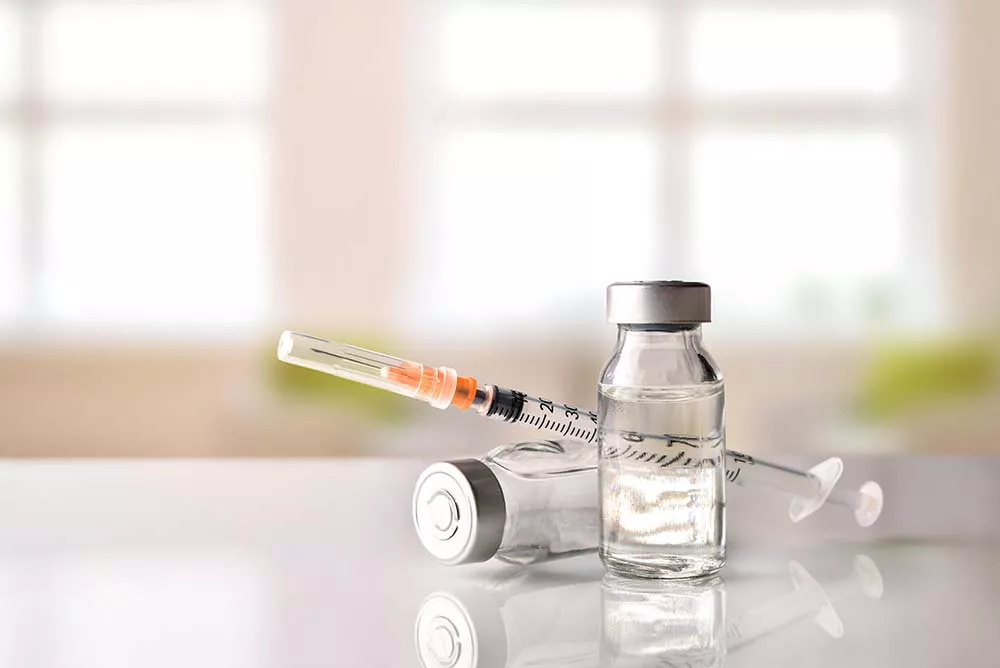Vivitrol is one of three medications approved by the U.S. Food and Drug Administration (FDA) to treat alcohol use disorder. Vivitrol is an injectable form of extended-release naltrexone prescribed for MAT (medication-assisted treatment). It is administered intramuscularly into the buttocks by a healthcare provider once a month in a clinical setting. Vivitrol is a non-addictive and non-narcotic prescription medication with a low risk of misuse and dependence. Vivitrol is used as part of a comprehensive treatment program to help reduce the risk of relapse and maintain abstinence while in recovery.
Vivitrol doesn’t instantly reduce cravings for alcohol; it takes time for it to produce effects. Therefore, it’s critical not to miss any Vivitrol shots when pursuing treatment for AUD to gain the full benefits of this medication. Missing a scheduled injection can dramatically impair the effectiveness of the next dose.
Vivitrol is most effective when used in conjunction with other elements of a MAT program to help individuals in recovery decrease the risk of relapse, reduce cravings, and maintain long-term abstinence.
Vivitrol is generally considered safe to use. However, all medications have a list of potentially negative side effects. Although side effects from Vivitrol use are relatively rare, they do occur in some instances.
According to the Food and Drug Administration (FDA), common side effects of Vivitrol include:
Inform your doctor immediately if the side effects persist or worsen with time. Your doctor will either reduce your dosage or prescribe an alternative medication.
Other potentially serious side effects of Vivitrol include:
The majority of injection site reactions are moderate and resolve on their own. However, certain negative reactions, such as tissue death, may necessitate surgery.
Vivitrol-induced depression can sometimes become severe, leading to suicidal behavior and thoughts. As a result, if you’re feeling depressed, hopeless, helpless, or have suicidal or self-harming thoughts, you must seek medical attention immediately.
Individuals who use Vivitrol while drinking alcohol do not experience any substantial risks. But you should keep in mind that Vivitrol does not reduce the intoxicating effects of alcohol. It only affects how your brain reacts to alcohol. If you drink while on Vivitrol, you won’t get the “rewarding” effects of alcohol, but may still experience other “regular” side effects of drinking, like impairment to your motor skills and cognitive function.
Vivitrol can be of great use to help you get sober. But there are many misconceptions about Vivitrol and what it does and does not do. Having clear expectations is important for anyone interested in taking Vivitrol as part of their recovery journey.
The use of alcohol in conjunction with Vivitrol will not:
Alcoholism or Alcohol Use Disorder (AUD) is currently the third leading preventable cause of death in the U.S. According to the 2019 National Survey on Drug Use and Health (NSDUH), 14.5 million Americans aged 12 and older had an alcohol use disorder, including nine million men and 5.5 million women.

Each person’s unique requirements and conditions determine if Vivitrol is the best treatment for their alcohol use disorder (AUD). If your doctor has prescribed this medication, they believe it will help you recover more quickly. However, it’s crucial to remember that Vivitrol isn’t the only medication for AUD.
There are currently three medications on the market approved by the FDA for the treatment of AUD:
Among the three medications approved by the FDA to treat AUD, Antabuse is the only medication that causes a high sensitivity to ethanol in alcohol. As a result, Antabuse is only prescribed to people who have completed their detox. However, this is not the case with Acamprosate and naltrexone for alcohol use disorder. These medications aren’t intended to make a person stop drinking by causing negative side effects.
While all of these medications have been shown to help reduce drinking, cravings, the likelihood of a relapse, their effectiveness in achieving and maintaining abstinence is only increased when these medications are used in conjunction with other elements of a rehabilitation program.
Vivitrol is most effective in individuals who are strongly motivated to stop drinking. Healthcare practitioners run a few tests before a Vivitrol treatment to screen an individual for liver disease and any signs of allergic reactions to naltrexone, polylactide-co-glycolide (PLG), carboxymethylcellulose, and other Vivitrol ingredients. A person is only considered eligible for a Vivitrol shot if they meet all of the criteria and conditions.
Vivitrol is safe and effective for both short and long-term usage, which is beneficial since people can use it for as little or as long as they need depending on their treatment goals. While some people will continue to take Vivitrol injections for a long time, others may only need it for a few months. However, most medical professionals recommend that Vivitrol be administered for at least one year for a better outcome.
While Vivitrol is an effective medication for addiction treatment, it’s not an ideal treatment option for everyone. Therefore, Vivitrol should not be taken by anyone who is:
A healthcare provider may test you for opioid dependence before Vivitrol treatment to mitigate the risk of sudden opioid withdrawal syndrome (SOWS). This test is conducted by administering a low-dose Vivitrol injection to determine if a person has any physical dependence on opioid-containing medications. This test is called a naloxone challenge test. Individuals will not be prescribed Vivitrol if they experience opioid withdrawal symptoms after the test. However, they may be eligible for Vivitrol treatment after an opioid-free period of 7-14 days before Vivitrol treatment and remain opioid-free after treatment.
Vivitrol combined with counseling and therapy has a 90% success rate in helping people achieve sobriety. While Vivitrol is still the treatment of choice for many people suffering from alcohol addiction and opioid dependence, it’s vital to assess the potential risks and benefits and seek medical counsel before taking this monthly injection.
If you are seeking help with your loved one’s addiction, contact us today or complete our quick contact form below, to speak with an addiction treatment specialist.
If you need help with your substance use disorder, we are here to help you build your confidence and momentum towards the future you want. We provide treatment services for adults with alcohol, opioid, and other substance use disorders. We are currently located in Louisiana, Florida, Massachusetts, New Jersey, North Carolina, Ohio, Texas, and Washington.
 What Does Vivitrol (Naltrexone) Do?
What Does Vivitrol (Naltrexone) Do?
 Alcohol Addiction and Treatment Options
Alcohol Addiction and Treatment Options
 Virtual Addiction Treatment: is it as Effective as In-Person Treatment?
Virtual Addiction Treatment: is it as Effective as In-Person Treatment?